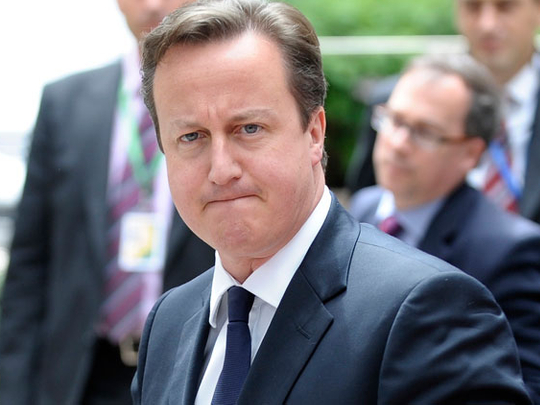
London: Prime Minister David Cameron has raised the prospect of a possible referendum on Britain’s future relationship with the European Union, potentially threatening trade with the bloc and opening up another front against the Conservatives’ coalition partner.
Britain has had a long and painful history of infighting and changes of heart over how closely to integrate with the EU ever since it joined its precursor four decades ago.
It has often proven divisive both within and among Britain’s main political parties as well as the public.
Fears over closer fiscal union in the single currency bloc in response to the euro zone debt crisis has heightened concerns among backbenchers, especially among the eurosceptics on the right of the Conservative Party and the electorate.
Polls suggest that if given a chance, voters would opt out of the EU.
Cameron, writing in the Sunday Telegraph, said he believed the “vast majority of the British people”, like him, wanted to make changes to Britain’s current relationship.
He wrote that for those outside the euro zone, “far from there being too little Europe, there is too much of it” in terms of bureaucracy. The question was how to get the relationship right.
“As we get closer to the end point, we will need to consider how best to get the full-hearted support of the British people whether it is in a general election or in a referendum,” he wrote.
“As I have said, for me the two words ‘Europe’ and ‘referendum’ can go together, particularly if we really are proposing a change in how our country is governed, but let us get the people a real choice first.”
The Conservative prime minister has resisted pressure from within his own ranks to hold a European referendum up to now, and in the article he did not give a timetable or offer a specific question.
A significant reason for holding back on a referendum is concerns surrounding the economic consequences of an exit from the free-trade bloc, Britain’s biggest export market.
Also, the junior partner in the coalition, the Liberal Democrats, are pro-Europe, and the two parties have already had their differences over key policies.
“Tactical and strategic patience” would need to be shown, the prime minister said.
ALL EYES ON THE ELECTION
Commentators suggested Cameron might use a referendum as an election fillip, ahead of the next parliamentary vote in 2015, especially after his party’s popularity took a knock after a budget in March.
The main opposition Labour Party has been debating about whether to hold a referendum around the time of the election.
An added pressure on Cameron has been the anti-EU party UKIP, the UK Independence Party, which has grown in influence, doing well in local elections in May on a ticket of total withdrawal from the EU.
In the article, Cameron wrote: “As a trading nation Britain needs unfettered access to European markets and a say in how the rules of that market are written.
“The single market is at the heart of the case for staying in the EU.
“I don’t agree with those who say we should leave and therefore want the earliest possible in/out referendum. Leaving would not be in our country’s best interests.”
But he went on to say: “An ‘in’ vote too would have profound disadvantages. All further attempts at changing Britain’s relationship with Europe would be met with cries that the British people had already spoken.”
It was the Conservative pro-European Prime Minister Ted Heath who signed up to the European project in 1971, and relations have been tense much of the time since.
In the 1980s, Prime Minister Margaret Thatcher was famously tough in negotiations with European partners.
The Conservatives were fatally divided by endless arguments during John Major’s premiership in the 1990s.
After the party returned to power in 2010 after 13 years in the wilderness, Cameron introduced a law that requires a referendum before any further transfer of powers from London to Brussels and refused last year to join a new EU fiscal pact.












